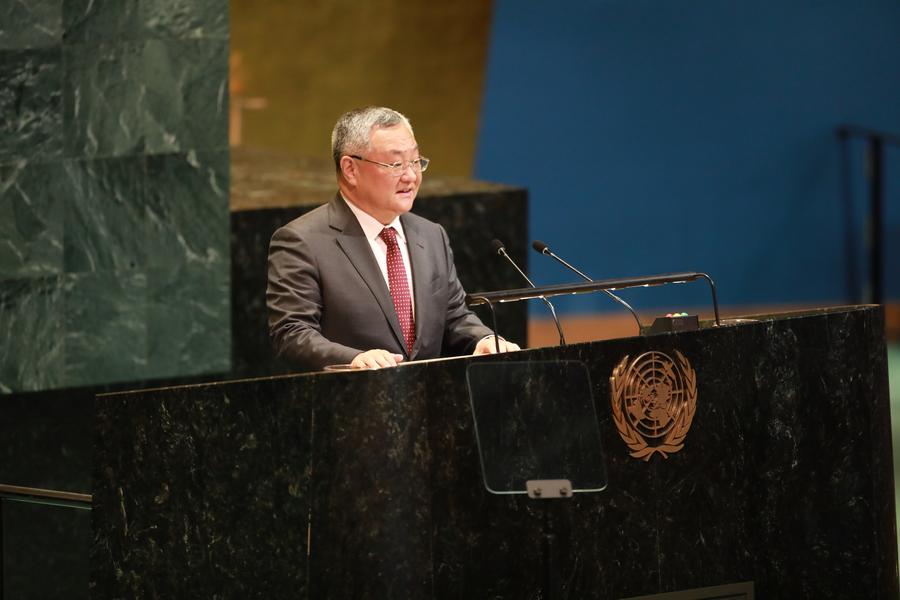
UNITED NATIONS - China remains gravely concerned about the prospects of the Security Council-authorized Gang Suppression Force (GSF) for Haiti, said the Chinese UN ambassador on Tuesday.
The UN Security Council on Tuesday adopted a resolution to transition the Kenyan-led Multinational Security Support (MSS) mission to the GSF for Haiti. China, Pakistan and Russia abstained from the vote.
In an explanation of vote, Fu Cong, China's permanent representative to the United Nations, said China did not block the adoption in light of Haiti's dire security situation and the concerns and appeals of the international community, especially those from the UN secretary-general and regional countries.
"This represents the utmost goodwill that China could demonstrate," said Fu. "At the same time, it must be pointed out that our questions and concerns remain. We are deeply worried about the operation and prospects of the GSF. We hope that the Security Council will closely monitor and strictly supervise this operation, in order to take timely and necessary actions based on the actual developments."
The draft, tabled by the United States and Panama, was ambiguous on key issues, said Fu.
In essence, the draft was to authorize, under Chapter VII of the UN Charter, a force with a mandate to conduct independently robust military operations. China believes that, out of accountability toward the Haitian people and the Security Council's decisions, the co-penholders should first provide detailed explanations on key questions such as the composition of the force, how to carry out its mandate, how to define the rules of engagement, and how to avoid civilian casualties. However, the co-penholders failed to provide meaningful information on these matters, and demanded quick action of the Security Council, he said.
"This approach, which demands the council issue a blank check on matters concerning the lives and safety of the Haitian people while giving away concrete responsibility, amounts to treating the council as a rubber stamp."
The draft was not the result of full consultations among council members, he said.
The co-penholders dragged their feet for six months before they introduced this draft just one month ago and demanded that the Security Council swiftly decide on establishing a brand new gang suppression force. Given the huge differences within the council, China and Russia proposed a technical rollover of the MSS mission to allow more time for thorough discussion and consensus-building. Regrettably, the co-penholders insisted on putting this highly contentious draft resolution to a vote. This not only undermines the solidarity and cooperation of the council on the question of Haiti, but also harms the council's credibility and authority, he said.
This resolution risks exacerbating Haiti's already complex and dire situation, warned Fu.
ALSO READ: UN: Gang violence in Haiti drove over 1m people from homes in 2024
The root cause for Haiti's multifaceted crises lies in the absence of a legitimate government and a vacuum in national governance, which has provided fertile ground and space for violent crimes, he said.
Currently, Haiti's political transition outlook is bleak, with gangs deeply entangled with political and business elites. Large numbers of civilians, including children, are recruited into gangs. At this juncture, resorting to military force to combat violence with violence is unlikely to succeed, but could further complicate the already intractable situation, he said.
At the same time, Haitian gangs are growing increasingly powerful, many armed to the teeth -- a phenomenon inextricably linked to an endless influx of weapons and ammunition into the country. UN reports reveal that the flow of weapons and ammunition originating from the United States has never ceased, rendering the Security Council's arms embargo against gangs meaningless, he said.
"Allowing weapons to flow into the hands of gangs while pushing for the deployment of armed forces to operate in Haiti is a contradictory approach that risks plunging Haiti into greater security turmoil and exposing both the Haitian people and the troops deployed to heightened risks," Geng said.
Two years ago, a certain country pledged solemnly that in order to ensure the success of the MSS, it would provide sustained funding. Today, this same country refuses to fulfill its financial obligations and demands "burden-sharing" by the broader UN membership for this country's proposed new force, all the while this country owes a huge amount of unpaid peacekeeping assessments, said Fu. "We cannot help but ask: how is it possible that one can demand burden-sharing from others when itself fails to fulfill its own obligations?"
Ultimately, it is up to the Haitian people themselves to overcome their difficulties. Unless all political factions of Haiti show their responsibilities, genuinely advance the political process, and truly commit themselves to national stability and development, no amount of external assistance, however substantial, can resolve the fundamental problems. Haiti should swiftly identify and embark on a path of self-reliance and development that is owned and led by Haitians themselves, he said.
China stands ready to continue to work constructively with the international community in helping Haiti emerge from this crisis at an early date, said Fu.


